Dentures – Westfield, NJ
Bid Farewell to Gaps in Your Smile

Do you suffer from extensive tooth loss? You’re not alone. According to the American College of Prosthodontists (ACP), roughly 178 million Americans are missing at least one tooth, and 40 million are missing all their teeth. If you contribute to either statistic, you understand just how much tooth loss can affect your quality of life. Fortunately, you don’t have to live that way forever. At the office of Dr. David Weinman, he offers dentures to help rebuild your smile and recharge your confidence. If you’re ready to bid farewell to gaps in your smile, continue reading or schedule a consultation with our team today!
Why Choose Dr. David Weinman For Dentures?
- Natural-Looking, Fully Customized Restorations
- Dental Insurance Welcome & Financing Available
- Experienced Dentist with Diverse Training
Who Is a Good Candidate for Dentures?

Regardless of how many missing teeth you are dealing with, you may be eligible to get dentures. This method of tooth replacement is excellent for patients who want to enjoy a complete, functioning smile once again. During your consultation, your restorative dentist in Westfield will conduct an oral examination to determine if this solution is right for you. It’s incredibly important that you have healthy gums to support your new prosthetics. That said, if you have problems like tooth decay or gum disease, you’ll need to work the appropriate care into your treatment before you can start the denture process.
Types of Dentures
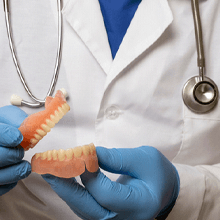
During a consultation, our dentist will assess your goals and needs to narrow down the right type of denture for you. Based on their findings, they will recommend one of the following options:
Partial Dentures
Types of Dentures
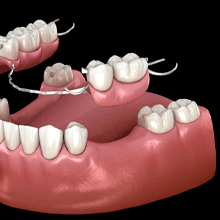
If you’re only missing a few teeth, partial dentures may be the ideal option. They fit between the teeth, seamlessly closing gaps throughout your smile. The gum-colored base and custom-shaded teeth are held in place using small metal clasps that loop around the neighboring teeth.
Full Dentures
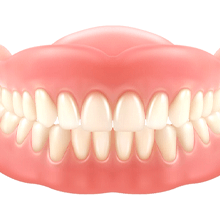
For patients missing an entire row of teeth, full dentures are an excellent solution to consider. They also have a discreet, gum-colored base and natural-looking teeth like partials. However, full dentures sit on top of the gums and are held in place using natural suction or a small amount of denture adhesive.
Implant Dentures
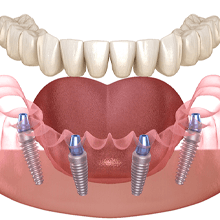
Do you want unmatched stability and durability? You might want to consider getting implant-retained dentures. A full or partial denture is attached to several dental implants that are surgically inserted into the jawbone. Because the titanium posts are placed in the bone, they stimulate it to prevent deterioration, and your new teeth benefit from great stability. Additionally, you can expect to enjoy your new smile for several decades with proper care and maintenance!
The Benefits of Dentures

Patients who choose to get dentures in Westfield can expect numerous benefits, including:
- Renewed ability to eat a nutritious diet
- Natural-looking results
- Easy to clean and maintain
- Affordable and trusted method of tooth replacement
- Improved self-confidence
- Lifespan that extends well over a decade with proper care and maintenance
Understanding the Cost of Dentures
 If you research the cost of dentures online, you’re likely to find a lot of different potential prices. The truth is that the amount you pay for dentures will vary depending on your circumstances. Our team is here to answer any questions you might have about the cost of dentures and help you create a strategy for making your new teeth as affordable as possible. Here are the basics that every patient should know when it comes to the overall price of dentures.
If you research the cost of dentures online, you’re likely to find a lot of different potential prices. The truth is that the amount you pay for dentures will vary depending on your circumstances. Our team is here to answer any questions you might have about the cost of dentures and help you create a strategy for making your new teeth as affordable as possible. Here are the basics that every patient should know when it comes to the overall price of dentures.
Factors That Affect the Cost of Dentures
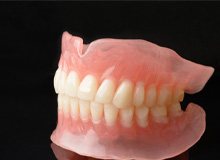
At your initial consultation for dentures, we’ll need to look at multiple factors that could affect the amount you’ll pay. A few examples of these factors include:
- Whether you’ll need tooth extractions or other types of preparatory work.
- The number of teeth that are missing.
- Whether you’ve lost teeth in one or both arches.
- The kind of material that your dentures will be made of.
Remember that cheaper dentures aren’t necessarily better dentures. Sometimes the lower cost is due to the use of poor-quality materials; as a result, your dentures might break more easily. Higher-quality dentures tend to have longer lifespans, which can make them worth paying a little extra for.
Are Implant Dentures More Expensive?
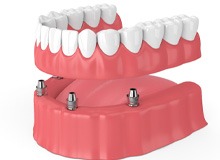
The short, simple answer is yes; implant dentures do have a higher cost than traditional dentures. That said, for many patients they are well worth the higher price. The implant posts will prevent your dentures from slipping and increase your overall biting strength. They can also stop bone loss by giving your jaw the same kind of stimulation it would normally receive from your natural teeth. Finally, implant dentures have a longer lifespan than traditional ones and thus will not need to be replaced as often.
Does Dental Insurance Cover Dentures?

Since dentures are typically considered essential for preserving oral health, most dental plans will at least partially cover them. Generally speaking, you can expect your insurance company to pay around 50% of the cost of dentures (though it’s worth remembering that the details of every plan differ). One of our team members can help you navigate your insurance benefits and explain what your coverage will look like.
Other Options for Making Dentures Affordable

Insurance is a useful tool for reducing your out-of-pocket dental costs. But if you don’t have insurance and aren’t sure that you’ll be able to pay the entire cost of care all at once, you may want to consider CareCredit financing. CareCredit is a third-party company that lets patients choose from several low-to-no-interest payment plans. You can pay for your dentures in a series of low monthly installments, which takes much of the stress away from the financial aspect of getting new teeth. Please contact our office for more details about how CareCredit works and how you can sign up.
Dentures FAQs

Are you interested in getting dentures and want to learn more about them? Step one is to give our office a call to set up a consultation where you can ask Dr. Weinman any questions you might have. Before you do that, though, you may want to do a little research online first. We want to assist you in any way we can, so please take a look at the FAQs that we have provided below.
What is the Average Age for Dentures?
There is technically no minimum age for dentures; they’re an option for virtually any adult who is missing several or all of their teeth. With that being said, it’s probably unsurprising to learn that the chances of needing dentures increase with age. Only about a third of adults between the ages of 20 and 39 are missing any teeth to begin with. On the other hand, about 57% of adults between the ages of 65 and 74 currently wear dentures to restore their smiles.
No matter what age you are when you start losing permanent teeth, you should reach out to a dental professional as soon as you can to see what solutions they suggest.
Is It Hard to Talk with Dentures?
Dentures do allow you to speak more clearly than you could with missing teeth, but it will take some time to learn how to speak properly with them. The changes to your palate can affect the movements of your tongue, resulting in a lisp.
The more you practice speaking with dentures, the faster you’ll get used to them. If you enjoy curling up with a good book at home, try reading aloud. You can also take note of any words that you find difficult to pronounce and practice saying them repeatedly.
What Can’t I Eat with Dentures?
There are plenty of things you can eat with dentures – and you’ll certainly have a more varied diet than you would with an incomplete smile – but the following foods can potentially give you trouble:
- Sticky Foods: Peanut butter and other sticky foods are known to frequently pull dentures off the gums.
- Foods with Small, Hard-to-Chew Pieces: Popcorn kernels and shelled nuts might damage your dentures or get stuck between your prosthetic teeth.
- Tough Meats: Some meats, such as steak and pork chops, are tricky to eat with dentures since they involve a lot of chewing. However, cutting them into small pieces and tenderizing them beforehand can help.
Can I Use Regular Toothpaste to Clean My Dentures?
No, toothpaste isn’t a good choice for removing food from dentures. The microscopic scratches it leaves on the prosthetic teeth can attract harmful bacteria, not to mention have a less-than-desirable impact on the appearance of your smile.
A better option for cleaning dentures is to use hand soap or a specialized denture cleaner. Using a toothbrush is still a viable option as long as it doesn’t have hard bristles.
